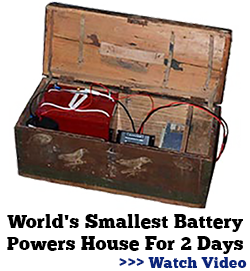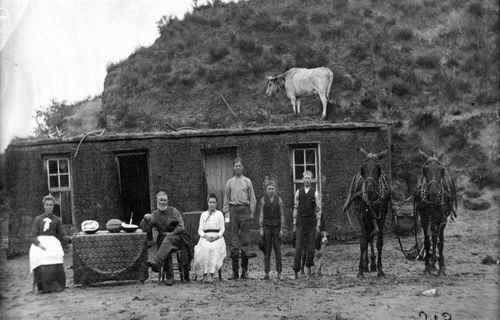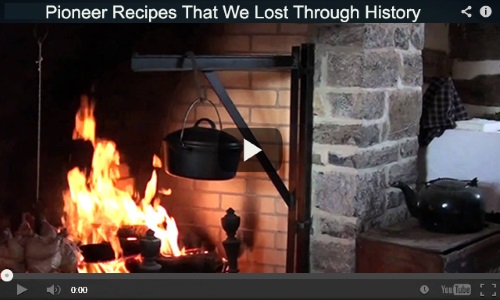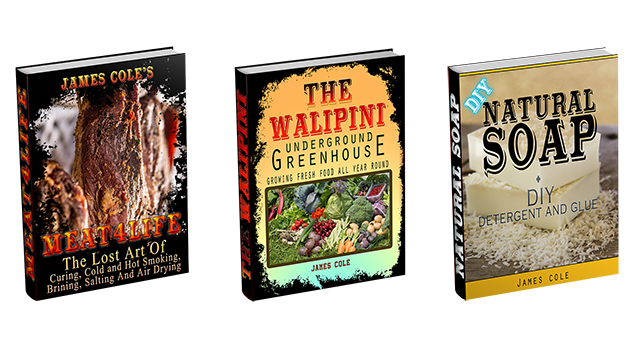Why Our “Modern” Way of Life Is a Disaster Waiting To Happen
For hundreds of generations our ancestors survived and thrived in balance with nature without electricity, without supermarkets, without running water, without the biggest military spending in the world.
They lived a hard life, but often also a happy and fulfilling life. They did not know the stress that we know today when we bustle about at a meaningless work, away from our family, for most of our productive lives. In many ways their lives were harder than ours, but they also had less worries, more freedom and more time for their loved ones.
Their simpler, more resilient (and some would say more meaningful) way of live was possible because they knew the skills of self-reliance. Skills that were passed down from generation to generation; from father to son and mother to daughter. Heritage life skills.
But these skills are no longer being passed down, they’ve been largely forgotten by 99.99% of families (in the developed world anyway). Instead we rely on centralized and fragile infrastructure and politicians to do things for us.
Of course I’m not saying we all should go back to living in caves and abandon electricity, tap water and all other modern comforts. I love my dishwasher.
I’m not saying either that we haven’t learned anything useful in the past 100 years. Humanity has made great progress developing and putting to use concepts such as permaculture, whole systems design, holistic thinking, and so on. We’ve also invented brilliant technology such as the internet, computers, solar panels and more that, if put to good use, can help you become a freer human being.
What I am saying is this: It might not be the best idea to be dependent on the status quo and bet ones life, liberty and pursuit of happiness on these modernities. If history shows us anything, and you’ll get examples of this in the three important lessons below, it’s that taking things for granted is a certain recipe for failure and misery.
Our ancestors were very familiar with these six ways to die. But if you’re reading this then you’re living proof that your direct ancestors were pretty good at surviving – at least long enough to pass their genes on.
Now, throughout the ages there have been, and still are, three sets of essential services which has protected man from dying. When these essential services are met it will allow you to not only survive, but also give you a solid foundation to thrive.
Henry David Thoreau called these “The necessaries of life“, and wrote in Walden that “not till we have secured these are we prepared to entertain the true problems of life with freedom and a prospect of success.”
Our ancestors knew this, and from the day they were born their primary education was all about how to secure these necessaries of life, while spending as little time and energy as possible, so that they then could continue in their pursuit of happiness.
Let’s be honest, life is not about just surviving. Life starts when you no longer have to worry about where to get your next meal or how to pay the next rent or where to get your next paycheck.
Self-reliance is simply about the life skills that allow you to provide for these three essential services yourself, as much as possible, without being dependent on someone else. It’s nothing more or less.
The same goes for “prepping”. It’s simply about preparing for disruptions to these three necessities of life.
1. Shelter
Shelter protects you from getting too hot or too cold. Shelter refers not just to your home and clothes, but also to essential things like power, cooling, heating and so on that makes your home habitable year round. Not all homes have these services, and not all climates require them.
2. Supply of Food and Water
A reliable and regular supply of food and water is a true necessity of life. These essential supplies are provided in very different ways in different parts of the world. In the developed world you likely get your food from a supermarket and your water from a tap; both relatively new inventions, and far from resilient.
3. Safety
Protection from illness is today provided by health care, hospitals, sanitation infrastructure such as flush toilets. Protection from injury is provided by police, security services and the military. In theory anyway. Before modern times, people and communities took responsibility for their own personal protection.
Originally published : By
What Our Ancestors Were Up Against
The six threats to your life, as categorized by global resilience expert Vinay Gupta, are:
-
Getting too hot
-
Getting too cold
-
Thirst
-
Hunger
-
Illness
-
Injury
To survive, our ancestors developed skills to protect them from these threats. They learned how to make fire to stay warm. They built shelter to protect them from harsh weather. They mastered hunting and learned how to find and purify water. They learned which plants they could eat, which plants could be used to treat wounds and illness and which plants would kill. They learned how to avoid crossing paths with bad guys and, if needed, how to kill bad guys.
But daily life back then was not only about surviving. I’m sure people were just as happy back then as we are today. In some ways, I even think people had less worries then. No bills to pay, no need to get up early in the morning and drive to a work you hate, no need to yearn for yet another consumer gadget or luxury out of your reach. Work for them was about surviving, and the rest was all play.
This skill development took place over hundreds of generations of trial and error, and when it comes to “trial and error” in survival the ones who “erred” died and served as a lesson to the rest.

A family poses with the wagon in which they live and travel daily during their pursuit of a homestead, 1886.
Many of these “survival skills”, or life skills as I prefer to call them, were common knowledge up until just a few generations ago. In the past century so much knowledge has been lost. But much has been gained too, of course. Today, we require an entirely new set of skills to get by, but at the expense of our ancient know-how.
These skills that kept our forefathers alive are forgotten today in the sense that they’re no longer general knowledge. They’ve been forgotten because modern humans require another set of skills to survive, like how to make a steady income, drive a car, and stay on the right side of the law.
Modern lifestyle has turned people into highly-dependent beings; whether it’s dependency towards the car, towards the supermarkets, towards politicians, towards centralized infrastructure, you name it – it’s there in the majority of people in the developed world.
As George Dvorsky notes in this Gizmodo article:
Aside from a precious few who have gone out of their way to learn basic survival skills, most of us today would be utterly hopeless if we were plopped in the middle of a forest or jungle and suddenly forced to fend for ourselves using only the resources around us. To our ancient ancestors, we’d appear as helpless as babies.
Our modern infrastructure shields us from threats to our lives, and as long as everything works it’s all fine and dandy. But, as countless examples from history and more recent times show, when you’re dependent on things outside of your control and these things stop working then the people affected by the disruption or disaster are in for a rude awakening.
A part of me feels in the core of my being that it’s a bad idea to totally discard these forgotten skills of our forefathers. Not quite yet, anyway.
Now let’s jump into the skills. It’s simple, you’ll find a long list of skills and underneath a few questions about each skill, the first ones that popped up in my head. Questions I bet most people wouldn’t be able to answer.
Shelter
Shelter protects you from getting too hot or too cold. As Vinay Gupta notes, “Shelter refers not just to the home, but to the essential services like power, cooling, heating and so on that make it habitable year round. Not all homes have these services, and not all climates require them”. Here are some skills our ancestors mastered in this area:
Building a fire
- How do you find dry wood in a wet forest?
- How do you find wood in winter?
- Which trees will give most heat and burn the cleanest?
- How do you build a fire to last all night?
- How do you make fire by friction?
- How do you make fire using flint and steel?
Building shelter
- How do I quickly set up a shelter in the wilderness using no tools?
- What kind of shelter is most suited for my climate and location?
- What material should I use?
- How do I build a roof that doesn’t leak?
- How do I patch a leaking roof?
- How do I insulate the home?
- How do I make plaster? And how do I make the plaster stick to the wall?
- How do I build a fireplace and chimney?

The Virgil Allen family, Custer County Nebraska 1892. A wagonload of sod stands ready to repair the roof. Photo by by Solomon D. Butcher
Making Clothes from Scratch
- Which plants in nature can be turned into fibre and threads used for sewing?
- How do I turn cotton, hemp or flax into a textile?
- How do I turn the wool that’s growing on a sheep into a warm shirt?
- How do I weave?
- How do I knit?
- How do I make leather from animal hide? (tanning)
- How, and from what material, can I make a needle?
- How do I make shoes?

A replica of a 5,300-year-old shoe that belonged to Otzi (credit: Josef Chlachula/CC BY-SA 3.0)
Blacksmithing
- How do I build a forge?
- Where can I find quality iron ore?
- How do I turn ore into iron?
- How do I turn iron into steel?
- How do I turn a slab of iron into X?
- How do I harden a metal with heat treatment?

Blacksmith at work. Photo: Jeff Kubina from Columbia, Maryland (CC BY-SA)
Knife making
- How do I make a knife from stone?
- How do I make a knife from steel?
- How do I harden a knife blade to make it keep an edge better?
- How do I sharpen a dull knife?
- How do I keep the knife from rusting?
- 25+ Free Knife Making Resources
Carpentry
- How do I build a chair?
- How do I build a door?
- How do I make door hinges?
- How do I repair X around the house?
- How do I assemble an IKEA book shelf? (just kidding!)
Masonry
- How do I make mortar?
- How do I make bricks?
- How do I make cement?
- How do I turn solid bedrock into uniform stone blocks that I can build things with?
- How do I build something durable without using mortar? (dry set masonry)
- How do I build a self-supporting vault?
Heating with Firewood
- What tree makes the best firewood?
- How do I select which trees to fell?
- What are the essential tools for firewood production?
- How do I stack the firewood for optimum drying conditions?
- These questions are all answered in an Execution Plan for Self-Reliance 365 members
Food
A reliable and regular supply of food is a true necessity of life. These essential supplies are provided in very different ways in different parts of the world. Chances are you get your food from a supermarket. Well, here’s a sobering fact: If food trucks stopped delivering to your supermarket, for example due to a natural disaster or financial meltdown, the store shelves will be empty within 48 hours. So it might just be worth it to learn some of the skills below.
Baking bread
- How do I make flour?
- How do I “make” yeast?
- How do I bake bread without electricity?
Making butter
- How do I turn cream into butter?
- What’s the most effective type of butter churn?
- How do I make butter last longer?

Farmer girl churning butter, near Long Branch, Ontario.
Cheese making
- How do I turn milk into cheese?
- How do I make curdled cheese?
- How do I process the curds into hard and soft cheeses?
- How do I ripen the cheese?
- How do I store cheese to make it last longer?
Cooking from scratch
- How do I cook without electricity?
- How do I cook using a dutch oven?
- How do I cook over an open fire?
- How do I make something taste good without following a recipe?
- What spices should I use when?
Tracking and Hunting Animals
- How do I track down an animal?
- What animal does this footprint / pile of crap belong to?
- How do I kill it?

Recognize the animal? Photo: Julie Wright (CC BY-SA)
Fishing
- How do I make a fishing net?
- How, and from what materials, can I make a decent fish hook?
- Which baits work?
- Which natural materials can I use as fishing line?
- Where do I find the fish?
- How do I tie a fly?
Trapping
- What animals can I catch using traps?
- How do I build a deadfall trap?
- How do I build a trapping pit?
- How do I make a snare, and where should I place it?
- How do I catch an animal alive?
- What can I use to lure the animal into the trap?

Painting of a lethal “deadfall” bird trap by Pieter Bruegel the Elder in 1565
Processing small animals and fish
- How do I gut and clean X animal?
Butchering
- Which parts can I eat and which parts should I throw away?
- How should I cut the meat?
- How should I package it?
- How do I make minced meat?
- How do you skin an animal without destroying the hide?
Archery
- What’s the best wood for bow making?
- How do I make a bow that won’t get brittle and break as the wood dries?
- How do I turn a tree into a bow?
- What material can I use for string?
- How are arrows made?
- What material can I use to make arrow tips?
- How do I build the arrows to help them fly straight?

Wooden bow grip making. Photo: Simon A. Eugster (CC BY-SA)
Gun Smithing
- How do I manufacture a rifle?
- How do I make gunpowder?
- How do I disassemble, clean, inspect, lubricate & reassemble a gun?

Homesteaders at Strool, South Dakota, 1909. Four men in front of a sod house, each holding a rifle or gun.
Gardening
- What kind of plants / vegetables / root crops / berries / fruits can I grow in my area?
- How do I know when to plant things?
- How do I make compost?
- How do I minimize weeds?
- Can I eat the weeds?
- How do I make biochar?
- How do I get started?
Orchard Management
- How do I plant a tree to give it the best possible start in life?
- How do I prune a tree?
- How do I propagate trees through seeds?
- How do I propagate trees through grafting?
- How do I manage diseases and pests?
Seed Saving
- How do I save seeds from X plant?
- How do I store seeds?
- How do I stratify seeds to get them to germinate better?
Home Brewing
- How do I make beer / wine / mead?
- From where can I get the yeast?
- How do I save the yeast until next time?
- How do I control the alcohol percentage?
Foraging / Knowing What to Eat
- What wild plants, berries, fruits, roots, nuts and mushrooms grow in my area that I can eat without getting killed?
- Which of them are in season now?
Preserving food
- How do I can food?
- How do I dehydrate food?
- How do I ferment food?
- How do I smoke food?
- How do I salt food?

Fish drying on racks, 1899, U.S. Fish and Wildlife Service.
Animal husbandry
Raising dogs and cats is much different than raising chickens, turkeys, ducks, rabbits, pigs, cows, and goats for the table. For all of these animals there are a number of questions one needs to have a grip on. A large part of being able to raise these animals is recognizing their needs and being able to diagnose their sicknesses.
- What do they need in terms of food, water, shelter, etc., to stay healthy and live a good life?
- What diseases are they prone to and how do you treat them?
- How do I fence them in?
- How do I milk a cow / goat?
- How do I help deliver a foal / piglet?
Bee keeping
- How do I build a hive?
- How do I capture a bee swarm?
- How do I harvest the honey without getting stung?
- What plants are beneficial for bees?
- 32+ Free Beekeeping Resources

The Beekeepers, 1568, by Pieter Bruegel the Elder
Water
A reliable and regular supply of water is a true necessity of life. These essential supplies are provided in very different ways in different parts of the world. In the developed world you likely get your water from a tap; a relatively new invention and far from resilient.
Finding Drinking Water
- What are the best places to find drinkable water?
- How do I know if it’s drinkable?
- What can I do to minimize the risk of drinking foul water?
Purifying water
- In what ways can I purify water?
- How do I make active charcoal for water purification?
Well Building
- How do I build a durable well?
- How do I know where to start digging?
Moving water with gravity
- How do I move water from place A to place B using only gravity?
- How do I move water uphill without using electricity?

The romans knew how to move around water using only gravity. Here’s the aqueduct Pont du Gard from around 40AD. Photo: Emanuele (CC BY-SA)
Safety
Protection from illness is today provided by health care, hospitals, sanitation infrastructure such as flush toilets. Protection from injury is provided by police, security services and the military. In theory anyway. Before modern times, people and communities took responsibility for their own personal protection.
Here are some skills that will help protect you from both injury and illness:
Staying out of harms way
- How do I avoid getting into fights?
- How do I avoid getting robbed?
- How do I defuse a situation that could turn ugly?
Handling a gun
- How do I safely handle a gun?
- How do I hold a gun properly?
- How do I aim a gun?
- How do I reload a gun?
- How do I maintain a gun?
Hand-to-hand fighting
- How do I throw a punch?
- Where should I aim?
- How do I avoid getting punched?
- How do I hold a person?
- How do I disable a person in the quickest amount of time?
- How do I defend against a knife attacker?
Perimeter Security
- How do I choose a strong defensive position?
- How do I harden structures against intruders?

The Chinese took their perimeter security seriously. Photo: Severin Stalder
First aid
- How do I clean and disinfect a wound?
- How do I dress a wound?
- How do I stop heavy bleeding?
- How do I perform CPR?
- How do I splint a broken leg / hand / finger / toe / back / neck?
- How do I close an open wound using suturing?
Making soap
- What materials do I need to make soap?
Herbal medicine
- Which plants can I use to treat X?
- How do I turn those plants into usable extracts, oils, balms, teas and tinctures?

Marshmallow roots from a cultivated Althaea officinalis plant, used The root was used in the Middle Ages for sore throat.
Waste Management
- How do I safely handle human waste when the flush toilet stops working?
- How do I turn what I usually flush down the sewers into high quality humanure and compost?
Pest Control
- How do I keep pests out of my food and home?
Making Alcohol
(for disinfecting wounds, of course)
- How do I distill grains and fruits into alcohol?
Other Skills
Navigation on Land and Sea
- How do I find my way in the wilderness without getting lost or going in circles?
- What natural features can help guide me?
- How do I build a compass from scratch?
- How do I navigate using the stars?
- How do I use Pace count beads / ranger beads?
Map reading skills
- How do I read a map?
- How do I navigate with a map and compass?
Candle Making
- How do I make candles from tallow?
- How do I make candles from bees wax?
- How do I make stearin?
- Which materials make good wicks?
Leatherworking
- How do I tan animal skin and hide to turn it into usable leather?
- How do I turn that leather into things I can use?

A Blackfoot woman fleshing a hide with a bone in 1928
Communicating with Strangers
- How do I make friends with strangers?
- How do I communicate with someone who doesn’t understand my language?
Haggling / Bartering
- How do I haggle?
- How do I barter using no money?
Group Survival
The biggest lost skill for survival, says primitive skills survival instructor Janulis in this article, “is not any one technique or prehistoric craft, but instead the loss of culturally and generationally developed subsistence patterns specific to an environment.”
Want To Relearn And Help Preserve Our Forefathers Skills?
As you can see, self-reliance means knowing the answers to quite a lot of questions. There are close to 200 questions in this article, and I’ve just scratched the surface. How many of them do you know the answer to?
Finding the best answers to questions like these and presenting them in a step-by-step manner is what we do in Self-Reliance 365 for our supporting members (without whom our work on the free Self-Reliance Catalog would not be possible).
Sure, you can google “How do I turn cream into butter?” and find many answers. Over 38 million answers actually. When we look for answers for our supporting members we don’t go to Google, we go offline. Our answers on these lost skills comes straight from the source, from old forgotten classic books written by past generations, and from first hand witness accounts from the past few hundred years.

Jim Norris and wife, homesteaders, Pie Town, New Mexico, 1940. I wonder how many self-reliance skills they knew?
Saving our forefathers ways starts with people like you and me actually relearning these skills and putting them to use to live better lives through good times and bad.
For just 22 cents a day you get answers to questions like the ones above two times a month in special Execution Plans, you get a bunch of discounts on popular tools, seeds and services for self-reliance from companies we like and trust, plus you enable us at Walden Labs to continue our work pushing the boundaries of self-reliance and building out the free Self-Reliance Catalog for the benefit of all.
Documenting these important life skills of our forefathers, be it knife making, food preservation, bee keeping, seed saving or herbal medicine, will be a big focus for Walden Labs in 2016.
If you’re like me and want to relearn and preserve these important skills that kept our ancestors alive throughout the centuries, so that we can pass these skills on to a new generation, read more about it here.
I think we can learn a lot from our forefathers, not just about surviving to live another day but also about thriving and finding meaning in this day and age.
Again, click here to learn all about Self-Reliance 365 and saving our forefather’s ways.
Books can be your best pre-collapse investment.
Old Time Wisdom ( Timeless Bits of Wisdom on How to Grow Everything Organically, from the Good Old Days When Everyone Did you can prepare yourself for war by moving to the countryside and building a farm, but you must take guns with you, as the hordes of starving will be roaming. Also, even though the elite will have their safe havens and specialist shelters, they must be just as careful during the war as the ordinary civilians, because their shelters can still be compromised.”)
The Lost Ways (Learn the long forgotten secrets that helped our forefathers survive famines,wars,economic crisis and anything else life threw at them)
Survival MD (Best Post Collapse First Aid Survival Guide Ever)
Conquering the coming collapse (Financial advice and preparedness )
Liberty Generator (Build and make your own energy source)
Backyard Liberty (Easy and cheap DIY Aquaponic system to grow your organic and living food bank)
Bullet Proof Home (A Prepper’s Guide in Safeguarding a Home )
Family Self Defense (Best Self Defense Strategies For You And Your Family)
Survive Any Crisis (Best Items To Hoard For A Long Term Crisis)
Survive The End Days (Biggest Cover Up Of Our President)





